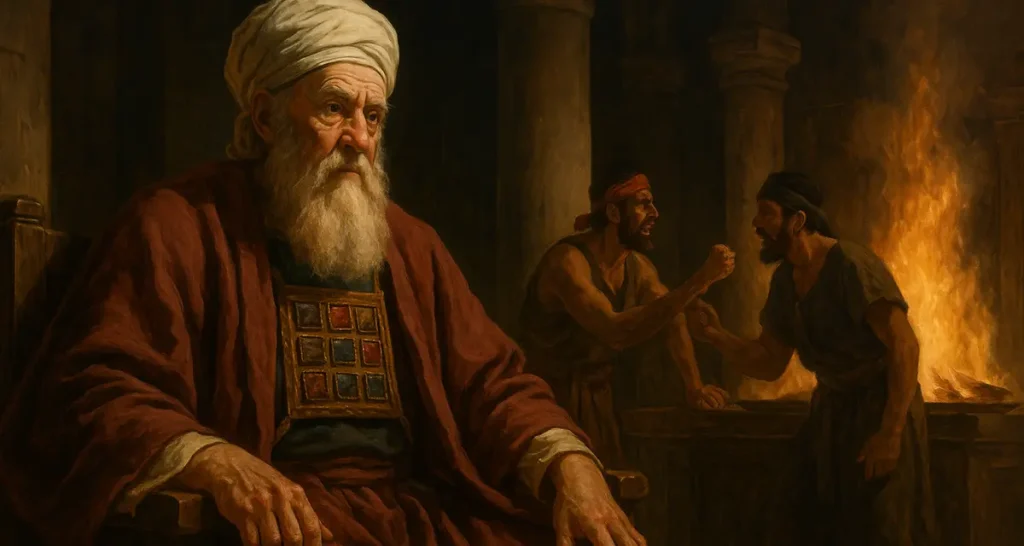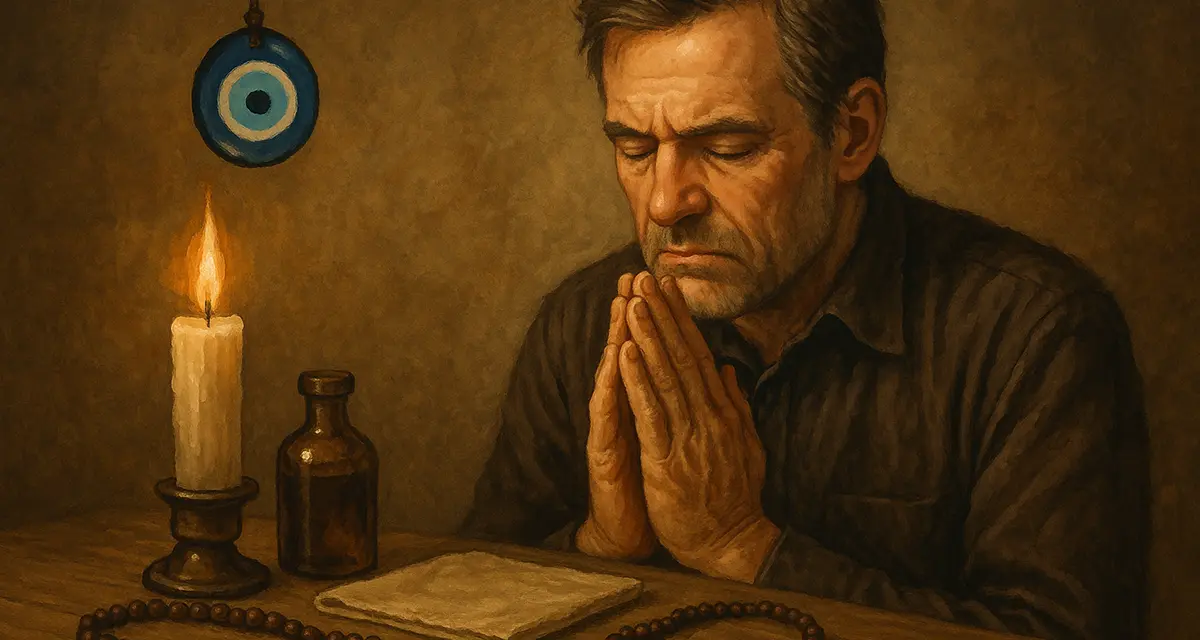What do we do when God seems to change His mind? When a promise once declared appears withdrawn—not just from one person, but from an entire lineage?
In 1 Samuel 2, we encounter one of the most jarring moments in the Old Testament. God declares through a prophet that He is cutting off the priestly house of Eli. Though they were once chosen to minister before the Lord forever, their corruption, abuse of office, and irreverence lead to divine rejection. The Lord’s words are piercing: “Far be it from me—for those who honor me I will honor, and those who despise me shall be lightly esteemed” (1 Sam. 2:30).
It sounds like a promise revoked. But is that what really happened?
This moment, and the questions it raises, lead us into the heart of some of the most vital theological tensions in Scripture—and in life.
God’s Unchanging Nature and Changing Responses
God does not change. His character is eternally perfect—“the same yesterday, today, and forever.” Yet His actions in history respond dynamically to human behavior. This is not contradiction; it is covenantal consistency. God is not a detached force bound to impersonal decrees. He is a relational being whose justice and mercy unfold within His holy character.
When He promised Eli’s house a place before Him, it was within the framework of fidelity. But the sons of Eli, Hophni and Phinehas, corrupted their calling—stealing offerings, abusing worshipers, desecrating the sacred. Eli knew and did not restrain them. The divine response was not whimsy. It was the fulfillment of justice already embedded in the original covenant.
God doesn’t revoke promises arbitrarily; He upholds righteousness faithfully.
God Does Not Change: The Anchor of His Nature
Scripture repeatedly affirms God’s immutability—His unchanging nature:
- “I the Lord do not change” (Malachi 3:6)
- “Every good and perfect gift is from above, coming down from the Father of lights, who does not change like shifting shadows” (James 1:17)
- “Jesus Christ is the same yesterday and today and forever” (Hebrews 13:8)
This truth is not just philosophical; it’s deeply pastoral. If God could change in His character—if He were moody, capricious, or swayed by the wind—we could not trust Him. His love could falter. His justice might waver. His promises would hang by a thread. Thankfully, they don’t.
His holiness, His faithfulness, His purposes—all are eternally consistent. He is, as the old hymn says, the “Rock of Ages.”
And Yet, God Responds: The Story of Relationship
Despite His unchanging nature, God interacts with humanity. He responds to our choices. He grieves, warns, withholds, and blesses. These are not signs of divine instability; they are signs of a living, covenantal relationship.
Consider these examples:
- God relented from destroying Nineveh when they repented (Jonah 3:10).
- God “regretted” making Saul king (1 Samuel 15:11).
- God changed His course when Moses interceded for Israel (Exodus 32:14).
Are these contradictions? No. These are God’s consistent character (justice, mercy, patience) engaging with real people in real time. He doesn’t change, but our posture toward Him can change how we experience Him.
It’s like a child walking toward or away from the sun. The sun remains constant—but the child feels either warmth or shadow depending on direction. So it is with God. His light shines steadily. Our response determines whether it leads us to healing or judgment.
Covenantal Faithfulness: Not a Contract, But a Relationship
God’s dealings with Eli’s household are a prime example of this relational dynamic. His promise to the priestly line was never a blank check to abuse power. It was a covenant, meant to be lived in reverence and obedience.
When the sons of Eli defiled their calling, they weren’t breaking terms on paper—they were violating a sacred trust. God’s response was not a reaction of surprise or frustration, but a fulfillment of His unchanging holiness and justice.
And here lies the mystery: God is the same yesterday, today, and forever—yet He walks with us through time, responding as a Father does to His children.
The Paradox that Grounds Our Faith
This tension is not a flaw in theology—it is its beauty. It means that:
- We can trust God’s character even when we don’t understand His actions.
- We can rest in His faithfulness, even when life feels unpredictable.
- We can engage with Him personally, knowing He listens, grieves, rejoices, and moves.
The God who never changes is not indifferent. He is infinitely responsive. That is not weakness. That is love.
The Cross as the Climax of Unchanging Purpose and Relational Response
At the Cross, we see this interplay most powerfully. God’s eternal justice demanded that sin be dealt with. His unchanging love provided the Lamb. And His response to our repentance—mercy, grace, and new life—never strays from His nature.
The God who cannot change made a way for us to change—and then welcomed us into His unchanging love.
So when God responds, it’s not because He has changed. It’s because He never does.
And that’s the best news a sinful world could ever hear.
Sovereignty and Responsibility
God’s sovereign will reigns over all, yet He dignifies human choice with real consequence. Eli’s story doesn’t pit sovereignty against freedom—it shows how the two interact. God is never outmaneuvered, yet He allows space for our response. His justice honors that space. When responsibility is abdicated, the repercussions are not unjust—they’re the tragic outworking of divine holiness colliding with human failure.
God’s Sovereignty: The Reign of a Holy King
To say that God is sovereign is to affirm that He rules over all things—not just in power, but in wisdom, purpose, and perfect justice. Nothing escapes His knowledge. Nothing derails His will. As Psalm 115:3 declares:
“Our God is in the heavens; He does all that He pleases.”
He is the Author of history, the Architect of redemption, and the Sustainer of every breath. His sovereignty is not a distant rule from a cold throne—it’s the tender, active reign of a Father-King whose plans are always good, even when they are mysterious.
Yet this does not make us puppets. Scripture consistently presents us as real agents, capable of real choices with real consequences.
Human Responsibility: The Dignity of Choice
From the garden of Eden to the judgment of nations, the Bible makes it clear: human beings are responsible for their actions. God gives commands, calls for obedience, pleads for repentance, and holds people accountable.
We are not robots acting out divine code. We are image-bearers—created with the freedom to love, the ability to choose, and the calling to reflect our Creator’s character.
The story of Eli’s house in 1 Samuel 2 is sobering in this light. God’s sovereign plan included a priesthood. But Eli’s sons chose corruption over consecration. And Eli, though warned, failed to restrain them. The result? Judgment.
Could God have overridden their choices? Yes. But He didn’t—because He governs with human responsibility, not instead of it.
Tension or Harmony? Yes.
This is where the mystery lies: God’s will is always accomplished—even through human will. But this does not negate the genuine nature of our choices.
- Joseph’s brothers sold him into slavery—wicked.
- God used it to save nations—sovereign. “You meant evil against me, but God meant it for good…” (Genesis 50:20)
- Pharaoh hardened his heart—culpable.
- God raised him up to display His glory—sovereign. “I have raised you up… so that my name may be proclaimed in all the earth.” (Exodus 9:16)
- Judas betrayed Jesus—responsible.
- God used it to accomplish redemption—sovereign. “The Son of Man goes as it is written of him, but woe to that man by whom the Son of Man is betrayed!” (Matthew 26:24)
This is not contradiction. It is divine orchestration—God weaving every thread, even those twisted by sin, into a tapestry of glory.
Why This Matters
Understanding this balance transforms how we live:
- It humbles us—because we are not in ultimate control.
- It dignifies us—because our choices matter deeply.
- It calls us to obedience—because we are accountable.
- It gives us hope—because even when we fail, God is still working.
The sovereign God calls us into a real relationship, where He empowers our will, holds us responsible, and never abandons His plan—even when we falter.
The Cross: Where Sovereignty and Responsibility Kiss
Nowhere is this more breathtaking than at the Cross. Human hands nailed Christ to the tree—wicked, unjust, cruel. Yet Peter proclaims:
“This Jesus, delivered up according to the definite plan and foreknowledge of God, you crucified and killed by the hands of lawless men.” (Acts 2:23)
Responsibility and sovereignty—both fully present.
Why? Because God is not merely controlling history. He is redeeming it.
So yes, God is sovereign. And yes, we are responsible.
And when we submit our will to His, we discover not tyranny—but freedom.
Not fatalism—but purpose.
Not futility—but the profound joy of walking with the King who reigns—and calls us to reign with Him.
Justice and Mercy, Law and Love
To modern ears, the judgment of an entire family line can feel excessive. But look closer: this was not God’s desire. It was the inevitable end of unchecked rebellion. And even in judgment, mercy was not absent. God raised up Samuel within Eli’s own household, a child whose faithful heart would carry forward God’s voice to the people. Justice closed one chapter; mercy opened another.
This is not legalism—it’s moral reality. God does not demand perfection, but He does require reverence. He’s not waiting to strike down the imperfect, but He will confront those who scorn what is holy.
God’s Justice: The Unshakable Foundation
Justice is not a side note in God’s character—it’s foundational.
“Righteousness and justice are the foundation of Your throne” (Psalm 89:14).
God’s justice means that He always does what is right. He never turns a blind eye to evil. He does not sweep corruption under the rug. His justice is not arbitrary or vindictive—it is His holiness responding rightly to sin.
So when Eli’s sons profaned the priesthood—stealing offerings, abusing worshipers, treating holy things with contempt—God did not remain silent. To do so would have been unjust. And justice, by its very nature, demands action.
But this is where the beauty begins to unfold.
God’s Mercy: The Relentless Undercurrent
While justice demands consequence, mercy offers compassion. And in God, these two are never enemies.
“The Lord is gracious and merciful, slow to anger and abounding in steadfast love” (Psalm 145:8).
Even in judgment, we find mercy. Consider this: God did not immediately strike down Eli’s sons. He sent a prophet. He gave Eli time to act. He raised up Samuel under Eli’s roof—a quiet mercy, preparing hope in the house of collapse.
God’s mercy doesn’t cancel justice; it tempers it. Mercy delays. Mercy warns. Mercy invites repentance. But if unheeded, justice will come—not because mercy failed, but because it was refused.
Law and Love: Not Opposites, But Partners
Many today see God’s law as cold and harsh, and love as warm and freeing. But in Scripture, law is born out of love.
“Oh, how I love your law! I meditate on it all day long.” (Psalm 119:97)
The law was not given to burden but to bless. It reveals God’s heart, protects His people, and points us to the beauty of holiness. It is an expression of divine love—guardrails for the soul.
And when the law is broken? Love does not vanish. It is love that leads God to discipline. It is love that calls us to return. It is love that sent Christ to fulfill the law we could not keep.
The Cross: Where Justice and Mercy Meet, Where Law is Fulfilled in Love
At the Cross of Christ, the full weight of justice fell. Every sin bore its price. God did not lower the standard—He met it Himself.
“He was pierced for our transgressions… and the Lord has laid on Him the iniquity of us all.” (Isaiah 53:5–6)
Yet in that same moment, mercy flowed freely. God’s justice was satisfied so that His mercy could be extended. The law was not abolished; it was fulfilled—in love.
“Love does no wrong to a neighbor; therefore love is the fulfilling of the law.” (Romans 13:10)
This is the paradox of the Gospel:
- God is just—He must judge sin.
- God is merciful—He longs to forgive.
- God is love—so He sent His Son to be judged in our place, that we might be forgiven forever.
How This Shapes Us
Understanding this balance changes everything:
- It keeps us humble—because we deserve judgment, yet received mercy.
- It keeps us holy—because love doesn’t ignore the law, it fulfills it.
- It keeps us hopeful—because no failure is beyond mercy, but no mercy is without reverence.
God’s justice makes sin serious.
God’s mercy makes forgiveness possible.
God’s law reveals the way.
God’s love walks it with us.
So we don’t choose between justice or mercy, law or love. We kneel at the Cross—where all four are gloriously one.
And from that place, we rise—not condemned, but changed.
God’s Honor and Our Autonomy
There is a lie our culture often believes—that honoring God means losing ourselves. That submission to divine authority crushes our freedom. But in the story of Eli, we see the opposite. Eli’s sons pursued autonomy, doing “what was right in their own eyes.” In doing so, they lost everything—honor, legacy, life.
God is not a rival to our freedom; He is its origin. True liberty is not the absence of boundaries—it’s the presence of purpose. And purpose thrives under the hand of a holy, trustworthy, and just Creator.
God’s Honor: The Gravity of Glory
When we speak of God’s “honor,” we are speaking of something far more weighty than human applause. God’s honor—His glory, name, and reputation—is not vanity; it is the reflection of His very nature.
“I will not give my glory to another” (Isaiah 48:11).
“For those who honor Me I will honor, and those who despise Me shall be lightly esteemed” (1 Samuel 2:30).
God’s honor is the rightful recognition of His holiness, justice, and love. To honor God is to acknowledge who He is and to respond accordingly—with reverence, obedience, and awe. It’s not optional—it’s the very purpose for which we were created (Isaiah 43:7).
Eli’s sons treated God’s sanctuary with contempt. They trivialized worship. They used their position for personal gain. They didn’t just disobey—they dishonored the Lord. And the result was not merely moral failure—it was a cosmic offense. Because to attack God’s honor is to resist the very truth upon which reality rests.
Our Autonomy: The Gift and the Illusion
We live in an age that prizes autonomy—personal freedom, individual choice, self-determination. And rightly so, to a point. Human beings were made with agency. God created us not as puppets, but as partners in His world, endowed with will and dignity.
But autonomy was never meant to be absolute.
When we detach autonomy from accountability to the One who gave it, it becomes rebellion. That’s what happened in Eden. That’s what happened in Shiloh. That’s what happens in every human heart that declares, “I’ll live my truth.”
Here’s the irony: in seeking to exalt ourselves, we forfeit the very freedom we long for. Eli’s sons misused their autonomy—and they lost their legacy. Every attempt to live apart from God’s honor ends in emptiness.
Honor Is Not Oppression—It’s Liberation
This is the scandalous truth the world struggles to grasp: Honoring God is not bondage—it is freedom.
“His commands are not burdensome.” (1 John 5:3)
Why? Because we were made to honor Him. It is our design. To live for our own glory is to swim against the current of our own created nature. But when we align our autonomy with His honor—when our freedom bows to His lordship—we flourish.
Jesus put it best:
“Whoever wants to save their life will lose it, but whoever loses their life for Me will find it.” (Matthew 16:25)
We were not meant to be autonomous lords. We were meant to be sons and daughters—free in submission, alive in surrender, exalted in humility.
The Cross: The Honor of God and the Humility of Christ
Nowhere is this tension resolved more beautifully than in Jesus. He, though fully divine, did not cling to His rights. He honored the Father perfectly, humbling Himself to death—even death on a cross (Philippians 2:6–8).
And what was the result?
“Therefore God highly exalted Him and gave Him the name above every name…” (Philippians 2:9)
The path of honoring God leads to joy, not loss. Jesus showed us that true autonomy is not independence from God—it is unity with His will.
Our Response: Choosing the Higher Honor
Eli’s story is a sobering warning. He honored his sons above God. He let fear or passivity outweigh reverence. And God responded—not out of wounded pride, but because His honor is the foundation of life itself.
And yet, the door to return is never shut. For those who will humble themselves, confess, and realign their lives to His honor—there is mercy, restoration, and unshakable purpose.
So let us choose wisely.
Not the illusion of untethered autonomy, but the dignity of worship.
Not the fleeting praise of men, but the eternal honor of God.
Not a life curved inward, but a life lifted upward.
Because in honoring Him, we find our truest selves—and step into a freedom no self-made crown can ever offer.
The Heart of the Matter
What happened to Eli’s house is a caution, not a contradiction. It is a mirror held to our own lives. God has made promises to His people—promises sealed not with sacrifices of bulls and goats, but with the blood of His own Son. These promises are sure. But the call remains: “Those who honor Me I will honor.”
Sanctification is not about striving to earn God’s love—it is about living in a way that honors the One who loved us first. In a world that sees God’s commands as chains, the believer sees them as keys—unlocking a life of dignity, integrity, and worship.
More Than a History Lesson
The story of Eli’s house in 1 Samuel 2 is not just an ancient record of priestly failure. It is a mirror.
It reveals not only the weight of spiritual leadership but the weight of every heart’s response to God. Whether you’re a priest or a parent, a prophet or a pew-sitter, the question remains the same:
Will you honor the Lord?
This is the thread that runs through the entire passage—not ritual failure, but relational failure. God is not merely counting sins. He is watching hearts. And the tragedy of Eli’s story is not just what his sons did—it’s that they despised the very One they were meant to serve.
Sin Is Not Just Breaking Rules. It’s Breaking Relationship.
The deeper problem with Hophni and Phinehas wasn’t just their immoral actions—it was their contempt for God’s presence. They stole from His altar. They treated His people with disdain. They dishonored His name.
They didn’t just break the law. They broke trust.
This is what makes sin so serious. Not because God is fragile or easily offended, but because He is holy, and our lives are designed to orbit around Him.
Sin bends that orbit inward. It turns us away from worship and into self.
But the heart that honors God—that fears Him rightly and loves Him deeply—is a heart that lives in harmony with how life was always meant to be.
God Is Looking for the Heart That Honors Him
“For those who honor Me, I will honor.” (1 Samuel 2:30)
This is not a transaction. It’s a relationship. God doesn’t need our honor to boost His glory. He invites our honor because it aligns us with His life-giving presence.
Eli failed not because he was imperfect, but because he stopped contending for what was sacred. He knew what his sons were doing, but he restrained them too little, too late. And in doing so, he allowed the name of the Lord to be trampled.
This is not about legalism—it’s about love. God is not asking for flawless people. He’s looking for faithful hearts. Not those who always get it right, but those who won’t make peace with what’s wrong.
This Is Still Our Story
We all stand where Eli stood. We all wrestle with the temptation to prioritize comfort over conviction, relationships over righteousness, silence over truth. And we all have to choose:
Will we honor the Lord above all?
Because this isn’t just about Eli’s house. It’s about ours. It’s about how we lead our families, how we serve in the church, how we live when no one else is watching.
It’s about living in a way that says to the world, “God is worthy.”
The Good News: There Is a Better Priest, a Better Hope
Even as judgment fell on Eli’s line, God was already preparing something greater: a faithful priest, one who would do according to His heart and mind (1 Sam. 2:35). Ultimately, this points forward to Christ—the perfect Priest, who never failed, never faltered, and always honored the Father.
And in Him, we are not only forgiven when we fall short—we are empowered to live differently.
The heart of the matter is this:
- God is holy.
- We are accountable.
- But grace is real.
- And the call remains: Honor the Lord with your life.
So honor Him.
Not out of fear, but out of reverence.
Not to earn love, but because you are already loved.
Not to avoid judgment, but to walk in joyful communion with the God who is just, merciful, sovereign—and good.That is the heart of the matter.
And that is the heart God is still after today.
This story, then, is not about a God who breaks promises. It’s about a God who upholds them—with fierce justice, boundless mercy, and an unwavering desire for hearts that seek Him.
In Eli’s fall, we are warned. In Samuel’s rise, we are invited.
Honor Him. Walk with Him. And live in the freedom of being known and loved by a holy God.





